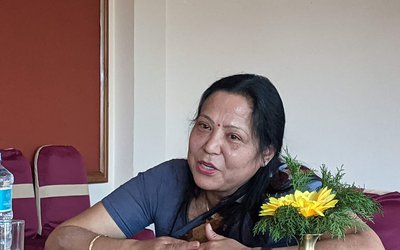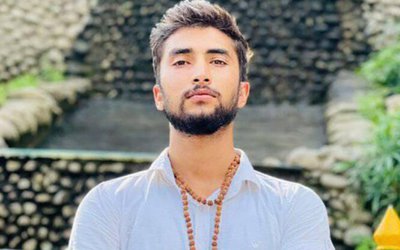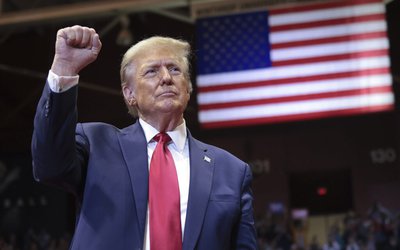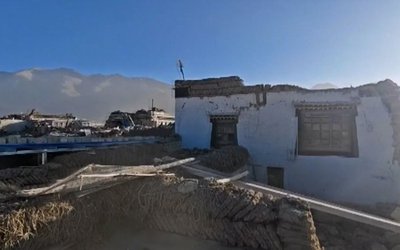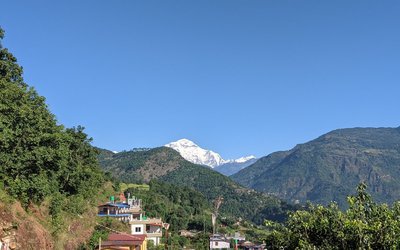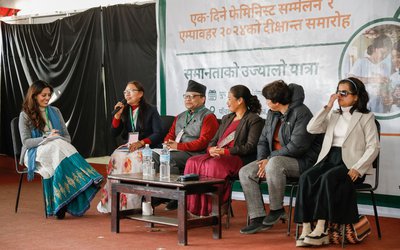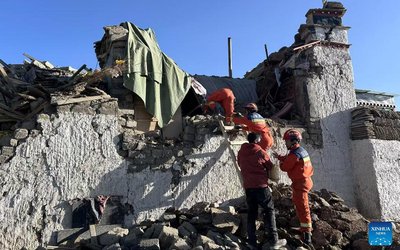
At a time when the government is taking a number of decisions to contain the rights of the people, including the banning of the assembly of people in public spaces, how do you see the future scenario for Nepal?
First of all the government is only mathematically strong, as a two-thirds majority. However, the government is facing reversals of its decision one after another, weakening its moral credibility. The government has lost moral credibility. Technically it is strong, but morally this is the weakest government.
In what ways do you see this government is weak?
The government has been compelled to reverse all its major decisions taken in the last three months. One of the major setback is the withdrawal of the medical bill following almost 28 long days of peaceful fasting by Dr. Govinda KC. Similarly, the apex court order not to implement the decision to ban the assembly of the people in public places, saying that it is against the fundamental rights and spirit of the constitution, is another lesson for the government. Likewise, court’s stay order to restore employees, relieved without giving reasonable time to defend, is also a big blow. After a strong pressure from all sectors, the government also withdrew the directives introduced to contain the role of NGOs and INGOs. The government also compromised with Umadevi Adhikary, forming a committee to look at her demands. Following the pressure of people, the government also reversed the decision to increase the tariff on internet.
How do you look at the nature of this government?
Given its actions of the last three months, what I can say is that this government is theoretically a government with authoritarian tendency. This government will not mind to work in an authoritarian way if the situation permits.
The nature of this government is bad and it is taking every step to encroach the rights of the citizens. The tendency is to violate the rule of law. It misused the two thirds majority. The government is a public trusty and people voted two thirds because of the trust. However, the government works against the trust of the people. Some of its actions are breach of public trust. It is unacceptable to a democratic society. The mandate given to the government is not for the subversion of constitution and people’s rights and freedom. The state is now spending the state coffers breaching the law. This will create misuse of financial rights and corruption. The government failed. The state has used two thirds in the name of nation building and all-round development and socio economic transformations. There are many examples in the world where the super majority government’s turned into a dictatorial and tyrannical rule. Nepali people have to take lessons from this government. The writing in wall is that Nepalese people have already enjoyed enormous freedom and it is impossible to contain them. We have history of long struggle. You cannot ban assembly in the public place. This is subversion of the constitution.
For an elected government with two thirds of majority, how can you say that?
The function of the government is to implement the constitution and follow it. Its role is to facilitate the rights and duties ensured by the constitution. That is the first and foremost duty of the state. Instead of doing these, it has created obstructions in freedom of people. The heart and soul of the constitution is the protection of rights ensured by it. Only during the period of emergency, you can suspend the rights even for a certain period of time and you cannot suspend the rights. Actually, the government’s intention is to execute undeclared emergency. Right to peaceful assembly is a fundamental right ensured by the constitution. However, the government banned the public assembly to completely infringe it under a notification. This does not have any legal basis. The role of state is to facilitate the fundamental rights ensured by constitution. After the interference of the court, the notice was cancelled. This has ended the credibility of the government.
How do you say that the government has violated the constitution?
Rule of law is the essence of democracy and the government has to ensure the rule of law. The government has released a person who was punished by the Supreme Court and the person was at large for eight years. This is a serious violation of rule of law. This has exposed that the government is not committed to the rule of law. Internet is the issue of rights. The present constitution has provisions of right to press, freedom of press. By raising the tariff, the government indirectly banned the media. With the public pressure, the government has withdrawn.
How do you view the government’s position on Dr. Govinda KC?
Govinda K.C is a great person, who has chosen the path of Gandhi to put pressure on the government. Every Nepali needs to salute him. Dr. KC compelled the government to surrender after 28 days of hunger strike. Instead of bringing the medical act as agreed upon with the previous government, the government introduced a new bill, violating all the previous commitments. Finally, Dr. KC stood for his cause with peaceful agitation. Social justice and health is also a part of fundamental rights. The state has to work for the poorer sections of society as Dr.KC said. But this government introduced the bill with a provision to protect the rich and mafia. The government defended mafia instead of Dr. KC’s demand. Instead of introducing replacement bill, the government introduced a bill distorting the agreement. A citizen had to fight a painful struggle and people from all over Nepal supported Dr.KC.
Why do you think the government wants to contain NGOs and INGOs?
After all, they are also the part of civil society working to make state accountable. The government has taken an arm twisting policy threatening those who believe in accountability and transparency. The government’s aim is to shrink the space of NGOs and INGOs. The government has shown that it is not going to tolerate the institutions which demand accountability. The government is also putting the pressure on media. The government has already announced that it will enact a law to control social media and regulate other media. Had the government succeeded on some previous issues, it would have come with more stringent methods. We need to be thankful to Dr. KC, who blocked the government’s intention to go the totalitarian way.
How do you see the state of transitional justice system?
Our transitional justice system has been over delayed. Although they constituted some commissions, they are no more than cosmetic. Both the commissions are now defunct. They are not accountable to victim and society at large. They are not made through transparent process. They spoiled three years’ time without any progress. The government also failed to bring laws to facilitate these commissions. The government has not made any foundational law as per directives of Supreme Court and transitional justice system. All state and non state actors want to block this. Non-state actors are in power and they want to dismantle this. As per the international law, serious crimes need to be investigated and those involved in it punished. The victims should be rehabilitated. It has been almost a decade since the signing of the comprehensive peace agreement. They made the process of transitional justice a hostage. This is a crime against victim and justice. Till we hold the credible justice system, you cannot see the logical end of transitional justice system. Transitional justice is a major component of peace process.
How do you see the present draft?
The government has thrown a draft but it is just an eye wash. The bill is trying to give impunity to serious violators of human rights. The bill does not include crime against humanity and war crime. The act proposed is to give impunity. The act also proposed minimum punishment. The proposed bill gives blanket amnesty. International law says punishment should be proportionate. You cannot make parallel law and it is against the principle of law or equality before law. This law has many loopholes. Nepal does not have law or there is need to formulate law with retrospective provisions for crime against humanity and torture. In a case like rape, the draft proposed is to give amnesty to all.
What will be the consequences?
We must not forget that if Nepal’s transitional justice does reach a logical conclusion, there will be increased international concern. We are in the globalised world and justice and rights issue are globalised and now it has become a legitimate concern of the international community. It is not to be taken as interference in internal matter. In Cambodia, trials are going on against war criminals even after forty years. Although Cambodia pardoned many war criminals, it was compelled to open files following massive international pressure. Smartly, government in Sierra Leone is also opening the files of war criminals. In serious cases, no state can accept blanket amnesty in serious crimes. All the war crimes can be investigated with retrospective law. Torture, rape, crime against humanity and war crime are international crimes. This will also attract international jurisdiction.
What else is to come?
If Nepal’s transitional justice cannot be concluded in a credible manner, we will be likely to see arrests of political leaders and security officials in other countries. Our leadership is yet to understand serious implications. If Nepal continues to provide impunity, it will become a failed state. If state cannot strengthen rule of law and if impunity cannot be addressed credibly, reparation ensured, if state does not take reform measures, the country will go back to conflict again. Due to failure to deal with transitional justice system, our constitution is also under a threat. One cannot rule out the possibility of derailment of our constitution.
Can a two thirds majority government cannot rule on its own way?
They understand two thirds as a mandate to violate the rights. However, the two third majority will not allow them to work on their own. It does not permit them to violate the constitution and constitutional provisions. Another issue is that the government has not shown any commitment to the constitution. There is still a centralized mindset. The constitution has given rights to local bodies. The constitution is nowhere as they are yet to constitute commissions. Although the constitution has set three years period to formulate the laws related to fundamental rights, the government has not done anything till now. Public has not seen any document in public domain.
- FM DR.RANA INDIA VISIT: Strengthening Relations
- Jan 02, 2025
- BUTWAL-HETAUDA Connected By 220 kV
- Jan 02, 2025
- PM OLI' CHINA VISIT: A Success For Business
- Jan 01, 2025
- ISRAELI AMBASSADOR SPEAKS: Israel For All Possible Support To Nepal
- Jan 01, 2025
- NEPAL-INDIA ENERGY TRDE: A Silver Lining For Nepal
- Dec 31, 2024





